What is MEN3 (MEN2B)?
There are two main tumours common to MEN3. These occur in the butterfly-shaped thyroid gland in the neck, and less commonly in the adrenal glands that sit on top of each kidney. The tumour in the thyroid gland is always cancerous (medullary thyroid cancer or MTC) and is more aggressive in MEN3 than those in MEN2. Each type of growth may occur alone and independently of MEN.
Blood and urine tests for hormone levels as well as scans of the neck and abdominal area are all used to check for growths. If a growth is found an operation may be needed to remove either just the growth itself or the whole of the affected gland. This is necessary as early as possible in childhood for the medullary thyroid cancer.
-
Thyroid Cancer
The butterfly-shaped thyroid gland is found at the base of the throat in the front of the neck. Almost 10 out of 10 (100%) of MEN3 patients will develop medullary thyroid cancer (MTC) sometimes within the first year of life. The thyroid cancer or the pre-cancerous hyperplasia, may be found using blood tests to measure levels of calcitonin. Treatment involves an operation to remove the thyroid gland and the nearby lymph nodes (total thyroidectomy and central lymph node dissection).
After the operation lifelong medication called levothyroxine needs to be taken. If calcitonin is detected after the operation, further surgery and other therapies are used to control it. MTC is usually slow growing and may often be managed effectively in this way without symptoms for many years. Children identified as having MEN3 are offered a thyroidectomy within the first year of life. Parathyroid glands are sometimes unavoidably removed at the same time as the thyroid gland (see parathyroids).
-
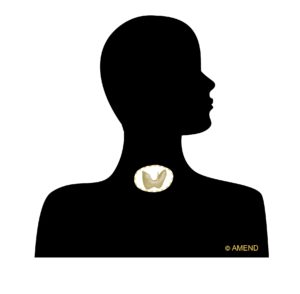
-
Parathyroid Glands
These small glands lie just next to or are sometimes embedded within the butterfly-shaped thyroid gland in the neck and help to control calcium levels in the body. Owing to their location, these glands may be unavoidably removed or injured during thyroid surgery. If the parathyroid glands are removed or injured, patients will usually have to take a daily Vitamin D capsule to help the body absorb calcium from the diet.
-
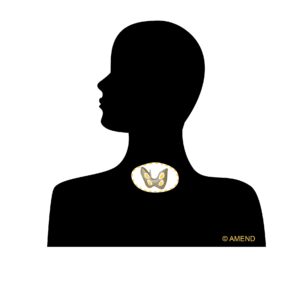
-
Adrenal Glands
The body’s two adrenal glands are normally each about the size of a whole walnut and sit just on top of the kidneys. A growth of the inner part of the adrenal gland is called a phaeochromocytoma (fee-o-cromo-sy-toma) and is almost always benign (not cancerous) in MEN. Phaeochromocytomas may grow for many years without causing severe symptoms but can be activated by events such as childbirth or surgery. Symptoms are varied and may include all or some of the following: sudden migraine-like headaches, palpitations, breathlessness, excessive sweating, high (or rarely low) blood pressure (constant or off- and-on), trembling, tiredness, depression, anxiety, and nausea with or without vomiting.
These growths may be detected using blood and urine tests as well as several different types of scan. Treatment involves an operation to remove the gland and growth. A period of medication before surgery is necessary to control the unstable blood pressure. If both adrenal glands are removed, lifelong medication is necessary.
-
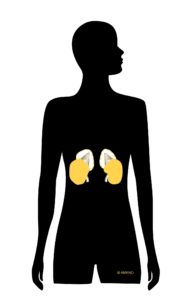
Author: Jo Grey, AMEND CEO, with the help of the AMEND Medical Advisory Team
Further Reading
-
MEN2b Patient Information Book
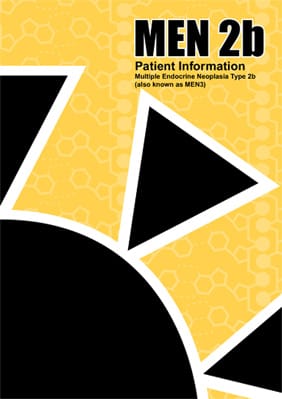
Updated 3rd edition of this popular book on MEN2b (aka MEN3). Now with glossary. We recommend that you discuss the contents of this book with your specialist - it is not for use in self-diagnosis, and not all of the information it contains may be relevant to you.
View Booklet
PATIENT STORIES
-
Patient Stories
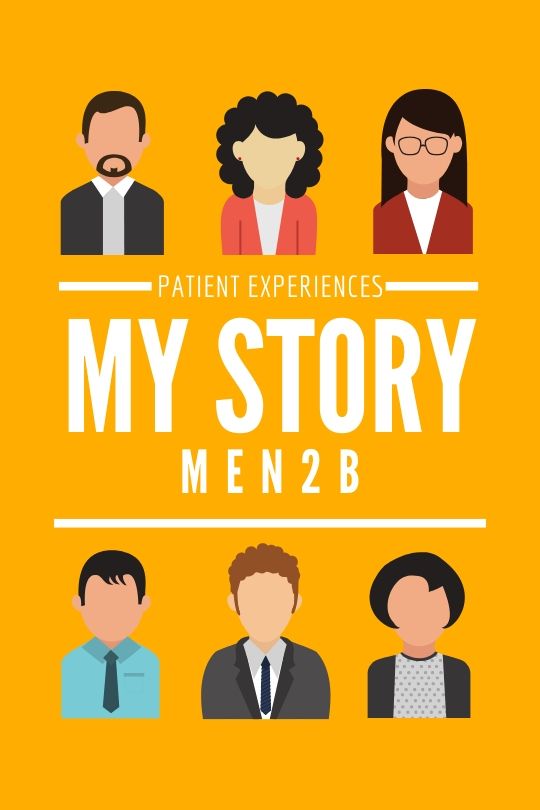
A number of our members have written about their journeys with MEN3 to help inform and perhaps also inspire others.
Click here to read more
-
My Story Template

Want to write your own story but don't know where to start? Use our handy template for inspiration! Just scan and send by email or pop it in the post.
Click here to download
VIDEOS
The following films were produced in early 2019 to raise awareness of MEN2B, to encourage earlier diagnosis, and to support other patients. We cannot have achieved this work without our incredibly brave film star volunteers – and they are all that – stars!
Hard of hearing? These films are available with subtitles via our YouTube channel.
Funded by AMEND and a grant from The Society for Endocrinology.
-
MEN2B and Me: Asher (Diagnosed at 6 weeks)
-
MEN2B and Me: Ethan (Diagnosed at age 12)
-
MEN2B and Me: Kristina (Diagnosed at age 2)
-
MEN2B and Me: Ethan's Own Words
Information Day Videos
-
Basic overview of MEN2A and MEN2B (Dr Steve Ball - 2015)
-
MEN2A and MEN2B Metastatic MTC therapies (Dr Steve Ball - 2015)
Click here to view more videos on our YouTube channel
References and Information Production
Be involved
-
Make a donation
AMEND has a variety of ways to donate to show your appreciation for our work.
Donate now
-
Become an AMEND member
Membership is free so come and join our family
Join us
-
Latest News
AMEND is pleased to bring you our latest publication: ‘Starting a Family: Your Choices’. Funded by a grant from the Society for Endocrinology, this…
View News